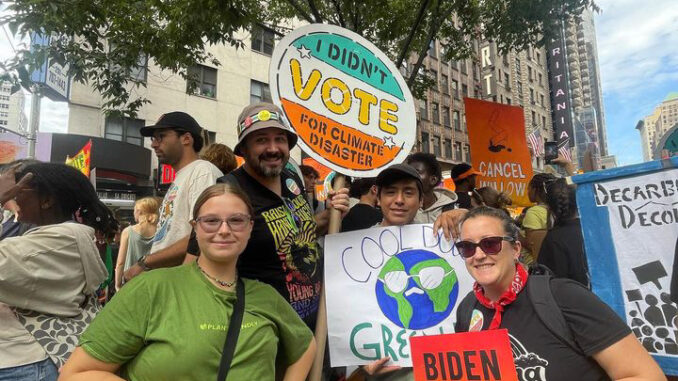
By Kate Dempsey (Reporting Assistance By Tony Lipka)
Flames were ablaze on Sunday, Sept. 17, as thousands carrying posters of the Earth on fire took to the streets in Midtown, Manhattan to protest America’s fossil fuel usage. Brooklyn College’s Sustainability Club and the campus’s New York Public Interest Research Group (NYPIRG) chapter joined forces with the marchers, leading the call for BC to take action in the climate crisis.
The march, organized by the youth-led grassroots movement Fridays For Future, was scheduled ahead of the United Nations General Assembly that is convening in New York this September. The theme for this year’s UN meeting, “Rebuilding trust and reigniting global solidarity: Accelerating action on the 2030 Agenda […],” is slated to discuss ways the international community can come together to address global crises of the environment, migration, and economic instability.
For activists, issues regarding climate change cannot be addressed without taking an intersectional lens and acknowledging the injustices the crisis has exacerbated for different communities around the world, especially the geographic disparities countries in the Global South face. While the 54 countries in Africa make up 4% of all carbon emissions, according to the Brookings Institution, these countries are left facing drought, food insecurity due to a lack of crops, and extreme weather conditions. This is in comparison to the U.S., which accounts for 20% of the world’s emissions but does not face a proportional amount of consequences, according to activists.
“When we say that we want climate justice, we are not just talking about transitioning to solar panels,” said Vanessa Nakate, a Ugandan climate activist and one of the key speakers at the march. “We are talking about leaving no one behind. We are talking about addressing the injustices that come with the climate crisis.”
Under direct fire by activists is President Joe Biden, who has continued to allow subsidies for fossil fuel companies and approved measures such as the Willow Project in Alaska that increases oil drilling, according to NPR. Activists held signs of cut-out hands with red marker reading “President Biden, our blood is on your hands!” Others changed the “I voted today!” sticker to say, “I didn’t vote for climate disaster!” For BC’s Sustainability Club, the call to end fossil fuels is largely a call on President Biden to take action.
“We share the same views, values, and desires outlined by the Fridays for Future organization and those attending the march,” said Sofia Maryiamis, president of BC’s Sustainability Club and a junior at BC. “President Biden has a unique opportunity to lead the world towards cleaner, less polluting energy options, reducing our dependence on harmful fossil fuels.”
Some politicians present at the march claimed that President Biden’s actions only harm America, not help it. Congressman Jamaal Bowman asserted that the U.S. “subsidizes its own self-destruction.” Other politicians argued that the economic instability many New Yorkers face could be alleviated by reallocating money subsidizing fossil fuels into the pockets of the lower and middle class.
“We have struggling people all over this city and this state. A shrinking middle class. People that have built this city looking for work. Instead of the billions going to the big wigs, let’s put it back in the pockets of regular New Yorkers by creating some jobs,” said State Senator Zellnor Myrie, citing that last year the fossil fuel industry made $200 billion in profit.
Activists highlighted the irony of the U.N. General Assembly meeting being held in a city that has been slow to shift to renewable energy. NYC is required by the 2019 Climate Act to reach 70% renewable energy by 2030, but has been slow to phase out its dependency on fossil fuels. While the protest focused on NYC’s accountability in the climate crisis, leaders stated that if NYC wants to be the “greatest city in the world,” they need to lead the way in addressing climate change and enact change now.
“We are moving in that direction, but we are not moving fast enough. It doesn’t seem too difficult to move faster, but we need leaders to take seriously that we are in a crisis,” said Mary Robinson, former president of Ireland and former U.N. High Commissioner for Human Rights. “This march is particularly focusing on here in the United States, but it’s a global problem.”
At BC, the Sustainability Club hopes that attending the protest will inspire more students to make change, partnering with groups throughout the city to get their shared message across.
“Students can be aware of how different organizations and/or community groups are making a change independently across NYC and support these efforts, making small changes across daily life to live more sustainably and aware of their environment,” said Michael Gonzalez, vice president of the Sustainability Club and a senior at BC.
The garden on campus teaches sustainable food production, and the Sustainability Department is actively working to create more water-filling stations. BC’s Sustainability Club has more in store for the campus for Sustainability Month in October, which can be followed on their Instagram page: @bcsustainabilityclub.
“The collective power of this diverse and determined crowd gives us hope and motivation to continue our efforts to protect our planet and create a more sustainable future,” said Maryiamis. “While the work to end fossil fuels is far from over, this protest was a significant step forward in raising awareness and pushing for change. We are hopeful that our voices will be heard and that meaningful action will follow.”
